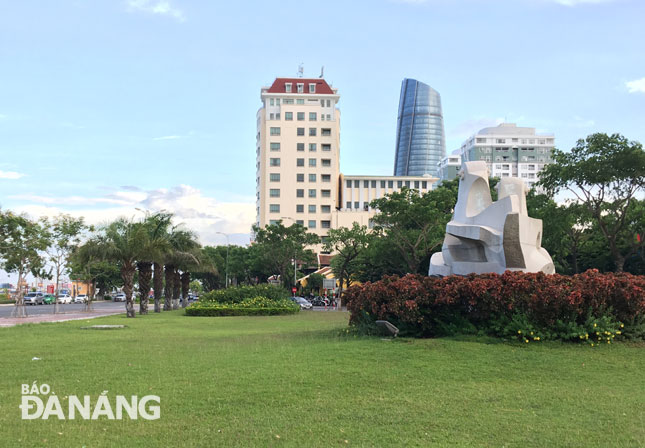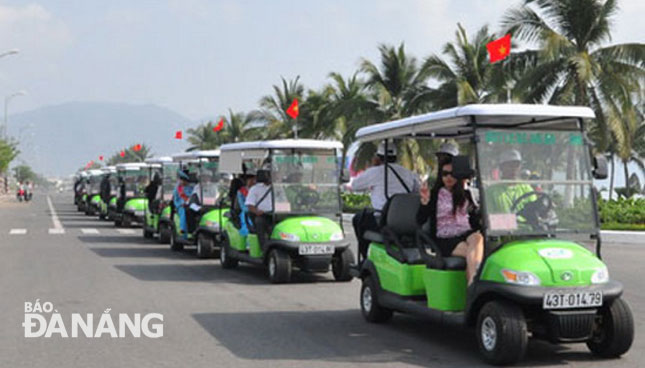Da Nang- national winner of WWF's One Planet City Challenge
On Friday, a ceremony took place to officially recognised Da Nang as the national winner of the 2017 - 2018 edition of the One Planet City Challenge (OPCC) initiated by the World Wide Fund for Nature (WWF) thanks for nationally pioneering in providing sustainable housing, transportation, and energy for the public.
 |
| More green spaces have been created across the city |
With this much-awaited award, Da Nang is the 2nd locality in Viet Nam to have been named as ‘Viet Nam’s National Earth Hour City’ after Hue City in 2016.
The result allows Da Nang to compete with the 21 cities worldwide for the title of the global winner of the 2017 - 2018 edition of the OPCC.
Da Nang really impressed the international jury board with its ambitious and innovative climate actions in an active response to the 2015 Paris Agreement on climate change. Accordingly, the city submitted a target of decreasing carbon emissions by 25% from 2016 emission levels by 2030.
Over the past 2 decade, the focus has been placed on implementing highly effective policies for making Da Nang an environmentally friendly, low-carbon, smart and creative city.
According to Mr Le Tung Lam, the Deputy Director of the municipal Department of Construction, by late last year, the city had seen a per capita green space of 7.3 m2, whilst the green coverage across the city had reached 43.6%.
Recent years have seen a growing tendency of green construction projects being built across the city.
More green spaces have been created inside local restaurants, coffee shops and holiday resorts, thereby giving them a new attractive look.
Over the past decade, the city scored 5 out of the 10 indicators set by the landmark project ‘Building Da Nang into an environmentally-friendly City’.
In detail, the city has seen the air pollution index (API) of less than 100, the a per capita green space of 7.3 m2, 98% of the total households in 6 districts accessing clean water, 85% of the total amount of domestic wastewater being treated, the solid waste collection rates in urban and countryside areas standing at 98% and 72%, respectively.
Most notably, green space promotion strategies have been added into the city’s master plan for its progress by 2020, with a vision to 2030.
In an attempt to reduce carbon emissions, heed has been paid to easing air pollution, shifting from industrial production activities to environmentally- friendly ones.
In fact, despite rapid urbanisation process, population growth, growing manufacturing services and the increasing number of cars, the API is decreasing considerably.
Furthermore, the city has taken many effective measures to develop many types of public passenger transportation using advanced, environmentally friendly technologies such as gasoline-electric hybrid vehicles, and develop designated bicycle lanes as well.
Alongside, importance has been attached to promoting the utility of renewable energy sources through developing solar power systems, promoting the public consumption of bio-fuel, initiating the constructing of an urban waste-to-energy plant, enhancing the green transport development, especially with Bus Rapid Transit (BRT) routes, and establishing waste water treatment systems throughout the city.
 |
| Clean energy vehicles are being used in tourism transportation activities |
Mr Van Ngoc Thinh, the Country Director of WWF-Viet Nam remarked that, as the national winner of the 2017 - 2018 edition of the OPCC, Da Nang is now inspiring other cities nationwide to foster green and sustainable development models.
Dr Truong Van Quang from the Viet Nam Urban Planning and Development Association (VUPDA) underlined a need to regard the entire city as a ‘big park’, with an attention paid to creating tree-lined streets featuring different display themes to make the local urban landscape more inviting.
In another perspective, Mr Truong Tuyen, the Director of Quang Nam Hydro-Meteorological Station, proposed that Da Nang should coordinate with other localities to protect water resources.
In addition to developing regulations regarding the integrated coordination to protect the environment at the Vu Gia - Thu Bon river basin, it is necessary for relevant agencies to promote experience exchanges in protecting this precious natural resource.
In his constructive idea, Mr Nguyen Duc Vu, Deputy Head of the Management Board of the Son Tra Peninsula and Da Nang Tourism Beaches, emphasised a must-do to paid even more attention to environmental protection, especially preserving and upholding the value of the Son Tra Peninsula, which is seen as a ‘green lung’ for the city, and keeping local beaches clean.
Mr Nguyen Nhu Nam, the General Director of the Viet Nam Travel Mart Company, suggested that the city should widely advertise its recognition as the national winner of the 2017 - 2018 edition of the OPCC to international friends for the sake of local tourism promotion.
OPCC, previously known as the Earth Hour City Challenge (EHCC), recognises and rewards cities that aim to provide sustainable housing, transportation, and energy for their residents while simultaneously engaging their citizens and acting as inspirational role models for other cities around the globe.
Under OPCC’s rules, invited cities in participating countries are required to report their ambitious and innovative climate actions, and to demonstrate how they are delivering on the 2015 Paris Agreement on climate change.
Data is entered on the carbonn® Climate Registry, and outreach and support is provided to cities in collaboration with ICLEI – Local Governments for Sustainability.
Since the inception of the Challenge in 2011, WWF has engaged over 400 cities across 5 continents.
In the 2017-2018 round, a total of 132 cities in 23 countries worldwide participated in the One Planet City Challenge, which has a thematic focus on sustainable transport and mobility as a major challenge facing cities everywhere.




